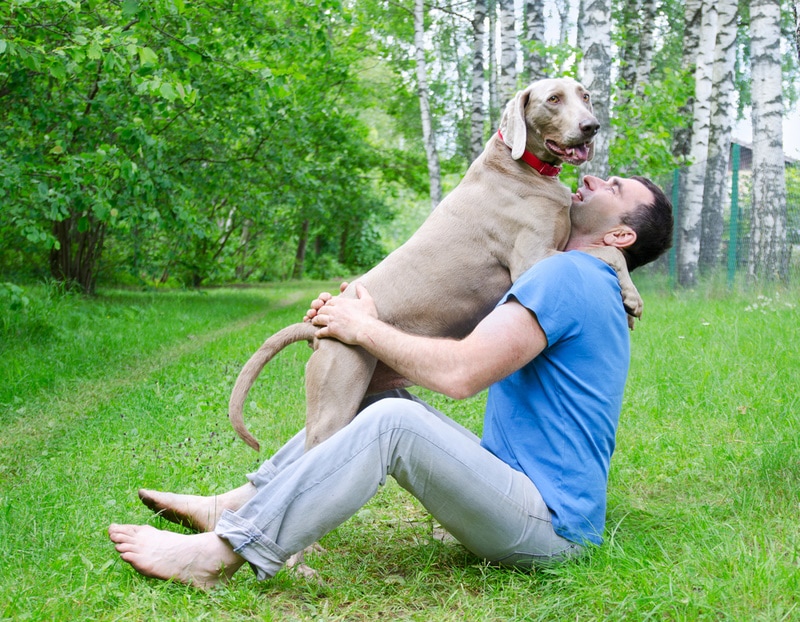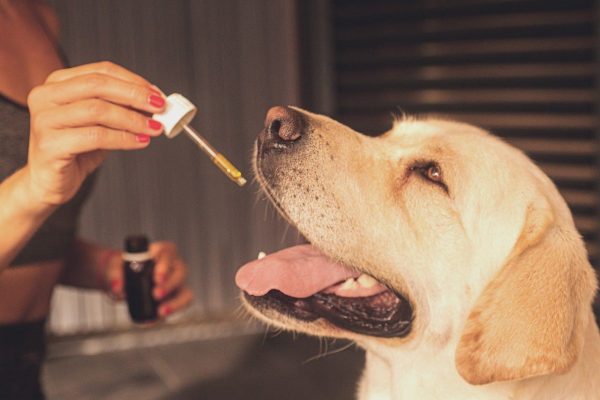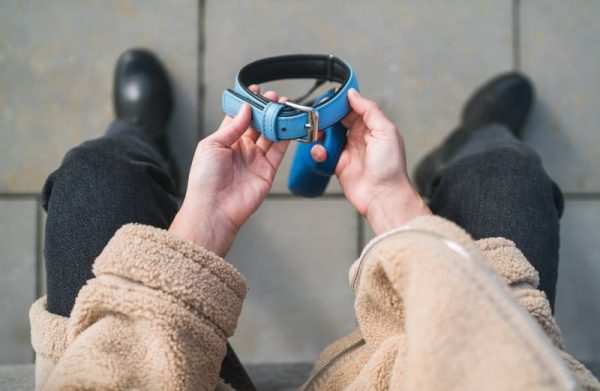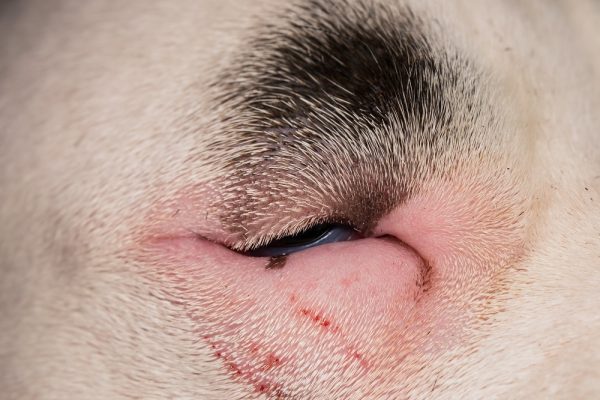Is your Weimaraner displaying clingy behavior? Do they follow you from room to room, seek constant attention, or become anxious when separated?
You’re not alone. Many Weimaraner owners experience this trait in their beloved companions.
Clinginess is common among Weimaraners, a breed renowned for its loyalty, affection, and desire for human companionship. These dogs often develop a deep bond with their owners and become emotionally attached, seeking constant interaction and reassurance.
This attachment tendency can manifest as clingy behavior.
Today, we will discuss factors contributing to Weimaraner clinginess, explore signs of clinginess, and provide practical tips to help you manage and reduce clingy behavior.

Common Signs of Clinginess in Weimaraners
How do you differentiate between what is expected of the breed and what is not natural? Here are some common signs of clinginess in Weimaraners.
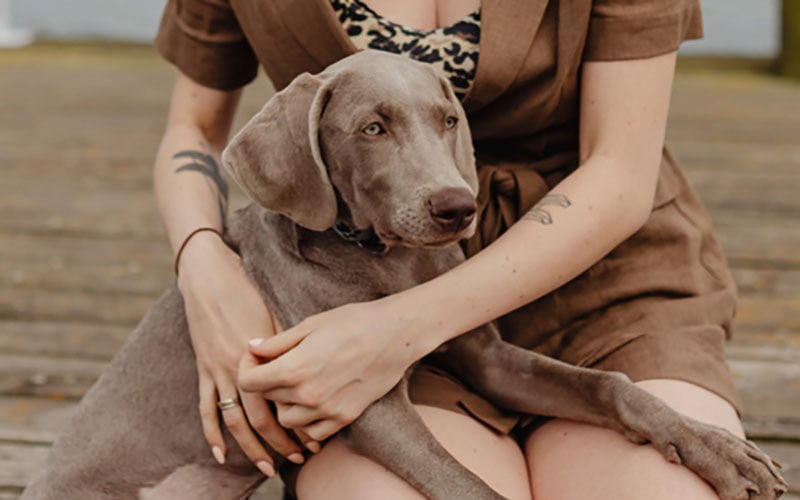
An Excessive Following and Constant Need for Proximity
Clingy Weimaraners may constantly follow their owners around the house. Naturally, Weimaraners are what most people consider ‘Velcro dogs’ because they constantly need to be with their human companions.
However, a clingy dog will want to be with you everywhere- including the bathroom.
This behavior can become significantly pronounced when the owner prepares to leave or when the dog is in a new or unfamiliar environment.
Anxious Behavior When Separated From the Owner
If your Weimaraner is prone to clinginess, it may exhibit signs of anxiety when you step away.
This can include restlessness, pacing, whining, or barking when you’re not within their sight. They may become visibly distressed or uneasy when left alone, even for short periods.
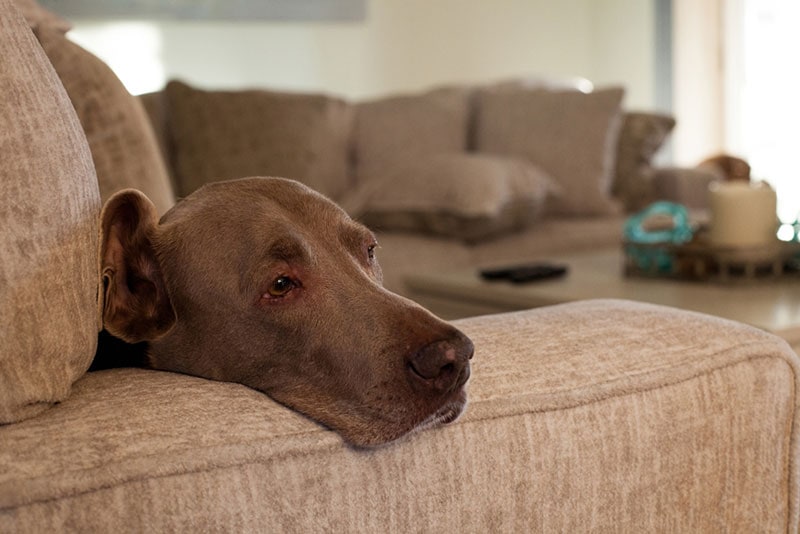
Excessive Vocalization or Whining When Left Alone
Clingy Weimaraners may resort to excessive vocalization to seek attention or express their distress when left alone. Your dog might persistently whine, bark, or howl until you return or give them attention.
Destructive Behavior
Clinginess in Weimaraners can sometimes manifest as destructive behavior, particularly if you leave them alone. They may chew on furniture, doors, or household items out of anxiety or frustration.
This behavior is often a result of separation anxiety and their desire to alleviate stress.

Why Are Weimaraners Clingy?
Clinginess in Weimaraners can stem from a combination of different factors. Understanding these underlying reasons can help you effectively address and manage your dog’s clingy behavior. The following are some of them.
Breed Predisposition and Attachment Tendencies
Weimaraners are known for their strong attachment to their owners.
Remember, this breed thrives on human companionship and desires constant interaction. Their loyal and affectionate nature can lead to clinginess as they seek reassurance and closeness with you.

Lack of Physical Exercise and Mental Stimulation
Weimaraners are energetic and intelligent dogs that require ample physical exercise and mental stimulation to thrive. When they don’t receive enough opportunities to release their energy and engage their minds, they may become restless and exhibit clingy behavior.
Separation Anxiety and Fear of Abandonment
These dogs may develop separation anxiety – a condition characterized by extreme distress when separated from their owners.
This anxiety can trigger clingy behavior. Routine changes, past abandonment experiences, or inadequate socialization can contribute to separation anxiety.

How Do I Deal With a Clingy Weimaraner?
It is possible and even advisable to manage and address clinginess in Weimaraners. The process requires a combination of strategies that focus on providing appropriate outlets for their energy, building their confidence, and reinforcing independence.
Regular Exercise and Mental Stimulation
Ensure that your Weimaraner receives sufficient physical exercise to help release pent-up energy.
Consider engaging them in brisk walks, jogging, playing fetch, or dog sports. Additionally, provide mental stimulation through puzzle toys, obedience training, and interactive games to keep their minds engaged and prevent boredom.

Use Positive Reinforcement Training Techniques
Utilize positive reinforcement training methods to teach commands, obedience, and desirable behavior.
For example, you could reward them with treats, praise, and affection when they exhibit independent behavior or remain calm during separation. Positive reinforcement helps reinforce their confidence and builds trust between you and your doggo.
Gradual Desensitization to Separation
Consider gradually acclimating your Weimaraner to being alone by implementing a desensitization process.
Start with short periods of separation and gradually increase the duration over time. One way of doing this involves providing them with a designated space, such as a comfortable crate or a specific room, where they can feel secure when alone. Pair this with positive experiences, such as special toys or treats, to create positive associations with separation.
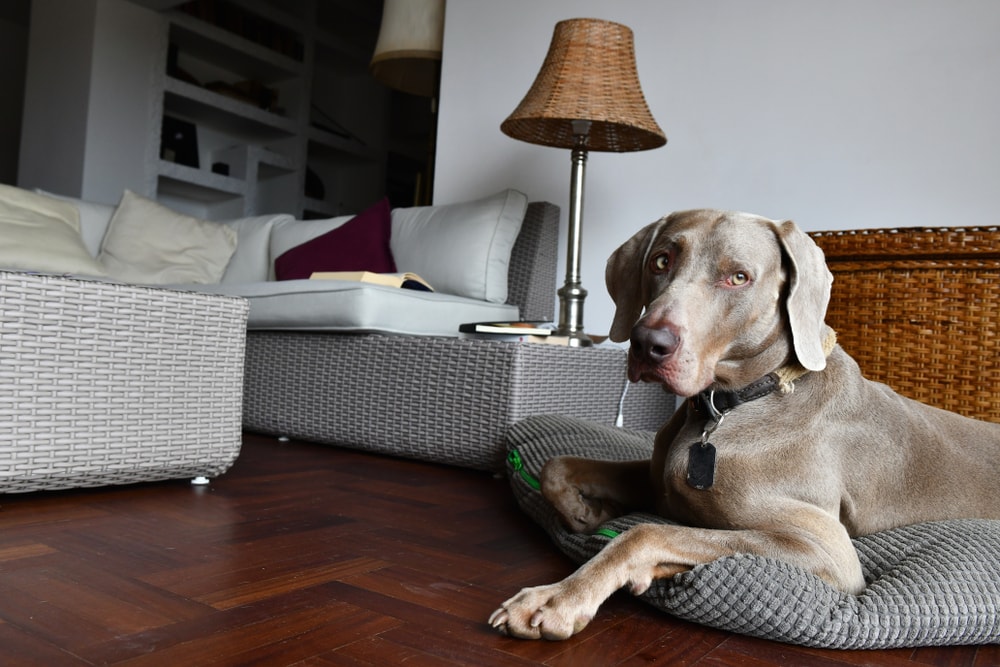
Establish Consistent Routines and Boundaries
Weimaraners thrive in environments with clear routines and boundaries. Establish consistent feeding, exercise, and playtime schedules to give them structure and predictability. Setting limits also helps them understand expectations and reduces their anxiety.
If you live in a big household, ensure everyone follows these routines and enforces the same rules to avoid confusion.
Seek Professional Help if Necessary
It is important to consult a professional dog trainer, behaviorist or veterinarian if your Weimaraner’s clinginess persists or significantly interferes with their well-being or your daily life.
A professional is in a better position to provide specialized guidance and develop a tailored behavior modification plan based on your dog’s specific needs.
Regardless of how you address clinginess in a Weimaraner, remember that it requires patience and consistency.
If you need to speak with a vet but can't get to one, head over to PangoVet. It's our online service where you can talk to a vet online and get the advice you need for your pet — all at an affordable price!


How to Keep Your Dog Healthy, Safe, and Happy
Keeping your Weimaraner healthy, safe, and happy requires considering their overall well-being. By implementing the following practices, you can provide them with the care they need to thrive.
Proper Nutrition
Provide a high-quality, balanced diet tailored to your pet’s age, size, and activity level.
Your dog needs a healthy diet to keep them in shape, maintain joint health, and reduce their risk of obesity and nutritional deficiencies.
Consult your veterinarian to determine the most suitable food options, portion sizes, and feeding schedule. Additionally, discuss including supplements, such as omega-3 fatty acids, to promote skin and coat health.

Regular Veterinary Care
Schedule regular check-ups with a trusted veterinarian to monitor your Weimaraner’s health, receive vaccinations, and address any potential issues promptly.
Regular wellness examinations allow for early detection of illnesses or conditions specific to Weimaraners, such as hip dysplasia, bloat, and certain genetic disorders. Consult with your veterinarian about breed-specific health screenings and preventive measures to ensure your Weimaraner’s optimal health.
Proper Socialization and Training
Proper socialization is crucial for Weimaraners to develop into well-rounded and confident companions. Exposure to various environments, people, and other animals from a young age will help them become comfortable and adaptable and prevent destructive behaviors like excessive chewing or digging.
Additionally, socialization plays a significant role in preventing separation anxiety, promoting independence, and reducing clinginess. Positive reinforcement-based training is essential for their mental well-being and to establish good behavior.
Consider enrolling your Weimaraner in obedience classes or working with a professional trainer to ensure consistent and effective training, setting them up for a happy and well-adjusted life.
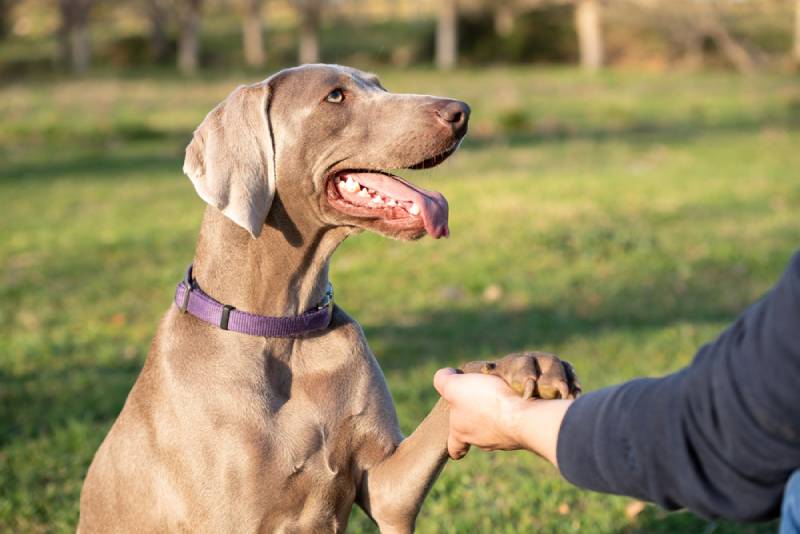
Provide a Safe Environment
Create a safe environment for your Weimaraner by puppy-proofing your home and yard. Remove any hazards or toxic substances that could risk their health. Ensure they have access to fresh water, a comfortable resting area, and adequate shelter from extreme weather conditions.

Conclusion
While Weimaraners are known for their loyalty and affectionate nature, they are prone to clinginess. The clingy behavior is usually due to their breed predisposition, attachment tendencies, and strong desire for human companionship.
It is important to recognize the signs of clinginess and address them through proper socialization, exercise, mental stimulation, and training. This will help promote a healthier and happier bond with your Weimaraner. Remember to provide ample physical and mental outlets, seek professional guidance when needed, and prioritize their overall health and happiness.
Featured Image Credit: Tatjana Baibakova, Shutterstock
